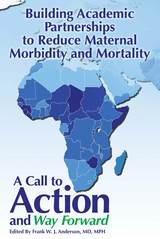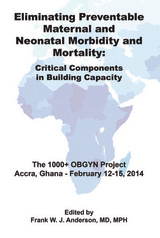
This book presents the collective wisdom of a group of Obstetrician/Gynecologists (OB/GYNs) from around the world brought together at the 2012 meeting of the International Federation of Gynecology and Obstetrics (FIGO) to contribute their ideas and expertise in an effort to reduce maternal and neonatal morbidity and mortality and obstetric fistula in sub Saharan Africa (SSA). The discussions focused on how to increase human capacity in the field of obstetrics and gynecology. The meeting was hosted by the University of Michigan Department of Obstetrics and Gynecology Global Initiatives program and was supported through a grant from the Flora Family Foundation.
Within the pages of this document, the current status of women’s health and OB/GYN training programs in 10 sub-Saharan African countries are described, with a Call to Action and Way Forward to training new OBGYNs in country. These are the words of obstetricians in the field, some who work as lone faculty in fledgling OB/GYN departments. These committed people are charged with the task of not only teaching the next generation, but may be the only OBGYN per 500,000 population or more. Their tireless pursuits are recognized, and their yearning for collegial support is palpable.
Every country should have a cadre of highly trained OB/GYNs to teach the next generation, contribute to policy development and advocate for progressive legislation, conduct the research needed to solve local clinical problems, and contribute to the field of women’s health in general. But most of all, it must be recognized that women across the globe have the right to access a full scope and high quality obstetrical and gynecological care when and where they need it. These pages bring to light successes achieved and shared, and lessons learned that have already spurred new programs and given hope to those eager for a new way forward.

This volume follows the first, entitled Building Academic Partnerships to Reduce Maternal Morbidity and Mortality: ACall to Action and Way Forward (http://amzn.to/22pZ0Wd), which identified the critical components for capacity building in expert women’s health care. Each chapter of this current edition is organized to address these critical components from multiple perspectives including African obstetrician/gynecologists, Ministries of Health and Education, American/European obstetrician/gynecologists and professional organizations.
Within the pages of this book, readers will encounter the tremendous passion African OBGYNs have for expanding their expertise to deal with the tragedies that befall women on a daily basis. The entire specialty of OBGYN is poised to mobilize the educational resources, experience and expertise to support African OBGYNs in their re-invention of Obstetrics and Gynecology in the African context, for the African continent. A complete reading of this book will leave the reader with a deep understanding of the issues and solutions.
The deficit of expert obstetric and gynecologic care in Sub-Saharan Africa leads to the silent suffering of millions of women and families due to unnecessary mortality and debilitating morbidity to women and girls of all ages. Pregnancy and its consequences have significant effects on women and they deserve safe labor and delivery with the expectation of bearing a live-born infant.
In 2016, we are rightly focused on maternal, perinatal and early neonatal mortality. This urgent crisis must continue to be aggressively addressed, but a long-term view would demand that targeted interventions must not occur in a vacuum. The same specialists who provide critical and lifesaving obstetric care are the same ones who can diagnose fetal problems, diagnose and treat ectopic pregnancy both medically and surgically, and treat the myriad medical and surgical issues that face women throughout their lifetime. In essence, they provide the complex, evidence-based interventions that women in most parts of the world enjoy. Current attempts to replace this expert and comprehensive clinical capacity with health workers trained to perform specific tasks has gained favor, and fills an urgent need. But when done without also creating the cadre and institutions for supervision, long-term prospects for impact are poor.
The rich text presented herein will not only tell the story, but will also provide the concrete steps needed to replicate the successful Ghana experience – sustainably - in other African countries. The 1000+ OBGYN Project (www.1000obgyns.org) has brought together a vast array of educational resources and a network of university programs, expert clinical organizations and professional societies to implement this collective wisdom. The group is poised for action to end preventable maternal and neonatal mortality by 2030. We welcome your interest and participation.
READERS
Browse our collection.
PUBLISHERS
See BiblioVault's publisher services.
STUDENT SERVICES
Files for college accessibility offices.
UChicago Accessibility Resources
home | accessibility | search | about | contact us
BiblioVault ® 2001 - 2024
The University of Chicago Press









